 1 citations,
January 2023
1 citations,
January 2023 Functional foods can improve hair and skin health.
 52 citations,
September 2018 in “International Journal of Molecular Sciences”
52 citations,
September 2018 in “International Journal of Molecular Sciences” Ginseng and its compounds may help hair growth and prevent hair loss, but more human trials are needed to confirm this.
 March 2024 in “Korean Journal of Pharmacognosy”
March 2024 in “Korean Journal of Pharmacognosy” Nymphaea caerulea flower extract can improve scalp conditions by reducing oil, inflammation, stress hormones, and blood vessel issues.
 12 citations,
June 2011 in “Han-guk sikpum gwahakoeji/Han'gug sigpum gwahag hoeji/Han-guk sikpum gwahak hoeji”
12 citations,
June 2011 in “Han-guk sikpum gwahakoeji/Han'gug sigpum gwahag hoeji/Han-guk sikpum gwahak hoeji” Lactobacillus plantarum-fermented plant extracts promote hair growth and thickness.
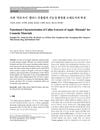 August 2013 in “Han'gug saengmul gonghag hoeji/KSBB journal”
August 2013 in “Han'gug saengmul gonghag hoeji/KSBB journal” Apple 'Hirosaki' callus extracts may improve wrinkles, stimulate hair growth, and have anti-inflammatory effects for use in cosmetics.
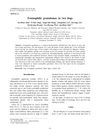 4 citations,
March 2011 in “Korean Journal of Veterinary Research”
4 citations,
March 2011 in “Korean Journal of Veterinary Research” Two dogs in Korea were diagnosed with a rare skin condition usually seen in cats.
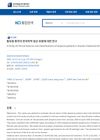 2 citations,
January 2009 in “The Journal of Korean Medicine Ophthalmology and Otolaryngology and Dermatology”
2 citations,
January 2009 in “The Journal of Korean Medicine Ophthalmology and Otolaryngology and Dermatology” Korean clinic alopecia patients were mostly 20-30 years old, had rapid onset, and showed different symptoms in men and women, with androgenic alopecia being the most common type.
January 2020 in “Korean journal of ophthalmology/Korean Journal of Ophthalmology” Minoxidil increases cell layer permeability by reducing tight junction proteins and raising ROS levels.
 10 citations,
October 2017 in “BMJ Open”
10 citations,
October 2017 in “BMJ Open” The Korean study confirmed that bariatric surgery is effective for weight loss in Asians.
 16 citations,
March 2014 in “Journal of the European Academy of Dermatology and Venereology”
16 citations,
March 2014 in “Journal of the European Academy of Dermatology and Venereology” Korean patients with PCOS often have skin problems like acne and excess hair, with different symptoms based on their specific PCOS type.
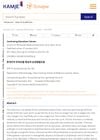 January 2013 in “Journal of The Korean Medical Association”
January 2013 in “Journal of The Korean Medical Association” The document's conclusion cannot be provided because the text is in Korean and cannot be parsed.
 January 2005 in “Korean Journal of Psychosomatic Medicine”
January 2005 in “Korean Journal of Psychosomatic Medicine” Women with alopecia often experience high levels of anxiety and depression, needing psychiatric help.
 January 2017 in “Korean Journal of Pharmacognosy”
January 2017 in “Korean Journal of Pharmacognosy” Modified red ginseng extract promotes hair growth and has antioxidant and anti-inflammatory effects.
2 citations,
December 2021 in “Korean Journal of Clinical Pharmacy” 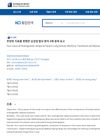 1 citations,
January 2017 in “The Journal of Korean Medicine Ophthalmology and Otolaryngology and Dermatology”
1 citations,
January 2017 in “The Journal of Korean Medicine Ophthalmology and Otolaryngology and Dermatology” Combining finasteride with a Korean herbal medicine called Gagamcheongyoung-tang can improve hair loss symptoms.
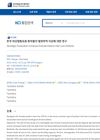 December 2013 in “대한피부과학회지”
December 2013 in “대한피부과학회지” Korean women with female pattern hair loss have higher levels of ferritin, testosterone, and vitamin D than average.
 2 citations,
August 2022 in “Korean journal of medicinal crop science/Han-gug yagyong jagmul hag-hoeji”
2 citations,
August 2022 in “Korean journal of medicinal crop science/Han-gug yagyong jagmul hag-hoeji” BLH308, made from persimmon leaf, green tea, and sophora fruit, may help reduce hair loss by fighting oxidative stress and inflammation.
 4 citations,
January 2019 in “Annals of Dermatology”
4 citations,
January 2019 in “Annals of Dermatology” RE-ORGA, a Korean herb extract, may help prevent hair loss.
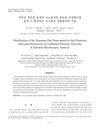 March 2012 in “Korean Journal of Microscopy”
March 2012 in “Korean Journal of Microscopy” Quantum dot nanoparticles can penetrate skin and reach sebocytes through hair follicles.
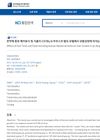 2 citations,
January 2011 in “The Korea Journal of Herbology”
2 citations,
January 2011 in “The Korea Journal of Herbology” Korean medicinal herbs in hair tonic and food increased hair growth in mice.
January 2021 in “Korean Journal of Chemical Engineering” 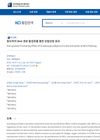 January 2016 in “Korean Journal of Pharmacognosy”
January 2016 in “Korean Journal of Pharmacognosy” Grateloupia elliptica, a type of marine algae, may promote hair growth by activating a specific cell growth pathway.
8 citations,
April 2012 in “Korean journal of medicinal crop science/Han-gug yagyong jagmul hag-hoeji” Rosa multiflora root extract promotes hair growth and prevents hair loss.
September 2017 in “Korean journal of acupuncture” Crataegi Fructus water extract may help treat hair loss.
 15 citations,
June 2011 in “Journal of Ginseng Research”
15 citations,
June 2011 in “Journal of Ginseng Research” Korean Red Ginseng may improve skin condition and reduce allergy markers in atopic dermatitis patients.
 June 2024 in “Korean Journal of Pharmacognosy”
June 2024 in “Korean Journal of Pharmacognosy” The compound from Rhododendron mucronulatum roots may help treat male pattern hair loss.
November 2016 in “Hanbang an'i'bi'in'hu pibu'gwa haghoeji” Korean and Western medicine have different effects on hair health.
 21 citations,
January 2018 in “The Korean Journal of Physiology and Pharmacology”
21 citations,
January 2018 in “The Korean Journal of Physiology and Pharmacology” Modified stem cells from umbilical cord blood can make hair grow faster.
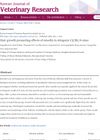 2 citations,
June 2016 in “Korean journal of veterinary research”
2 citations,
June 2016 in “Korean journal of veterinary research” Emodin may help hair grow similarly to minoxidil and could treat baldness.
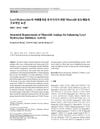 April 2012 in “KSBB Journal”
April 2012 in “KSBB Journal” Minoxidil analogs can be improved for hair growth inhibition by modifying specific parts of their structure.
























